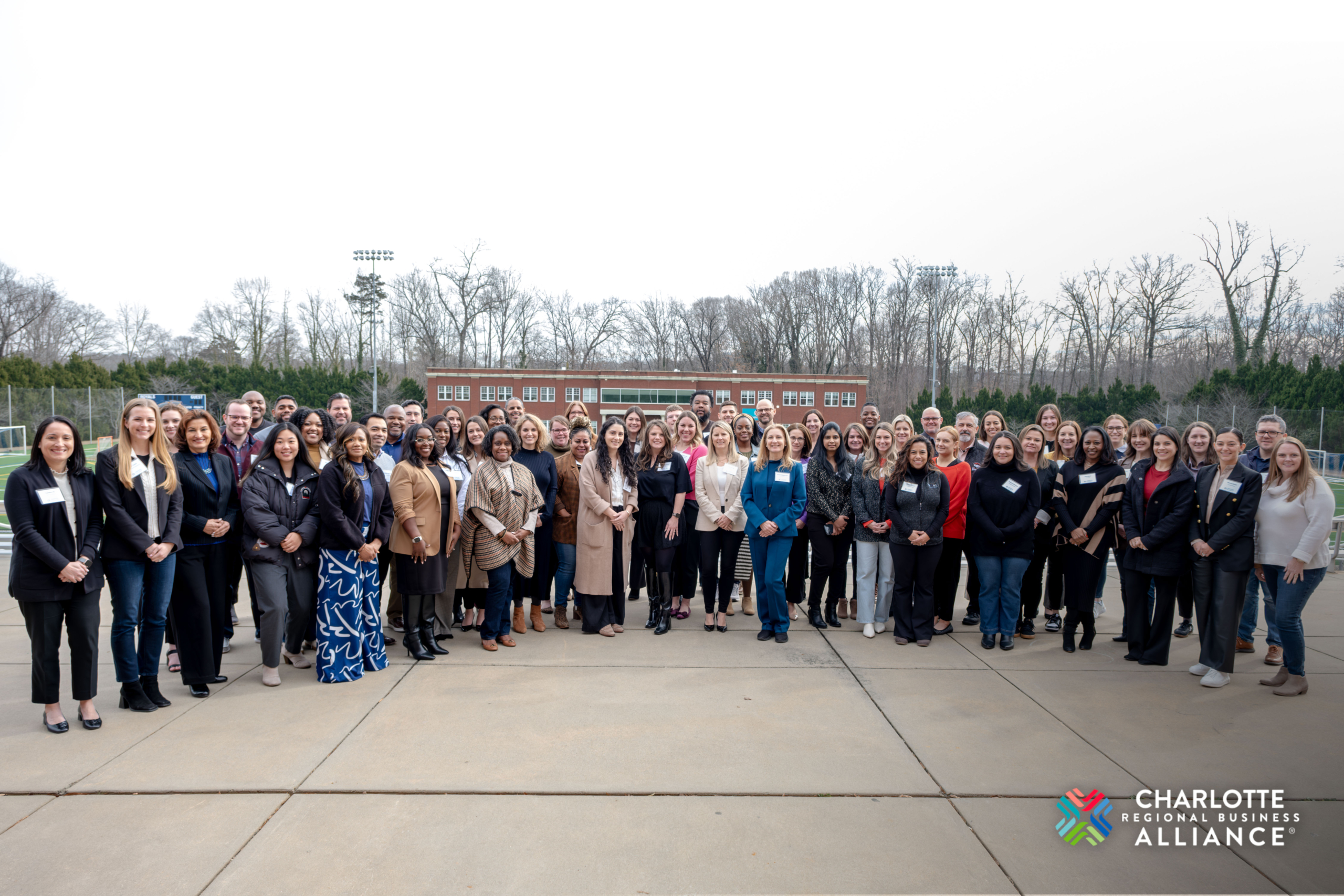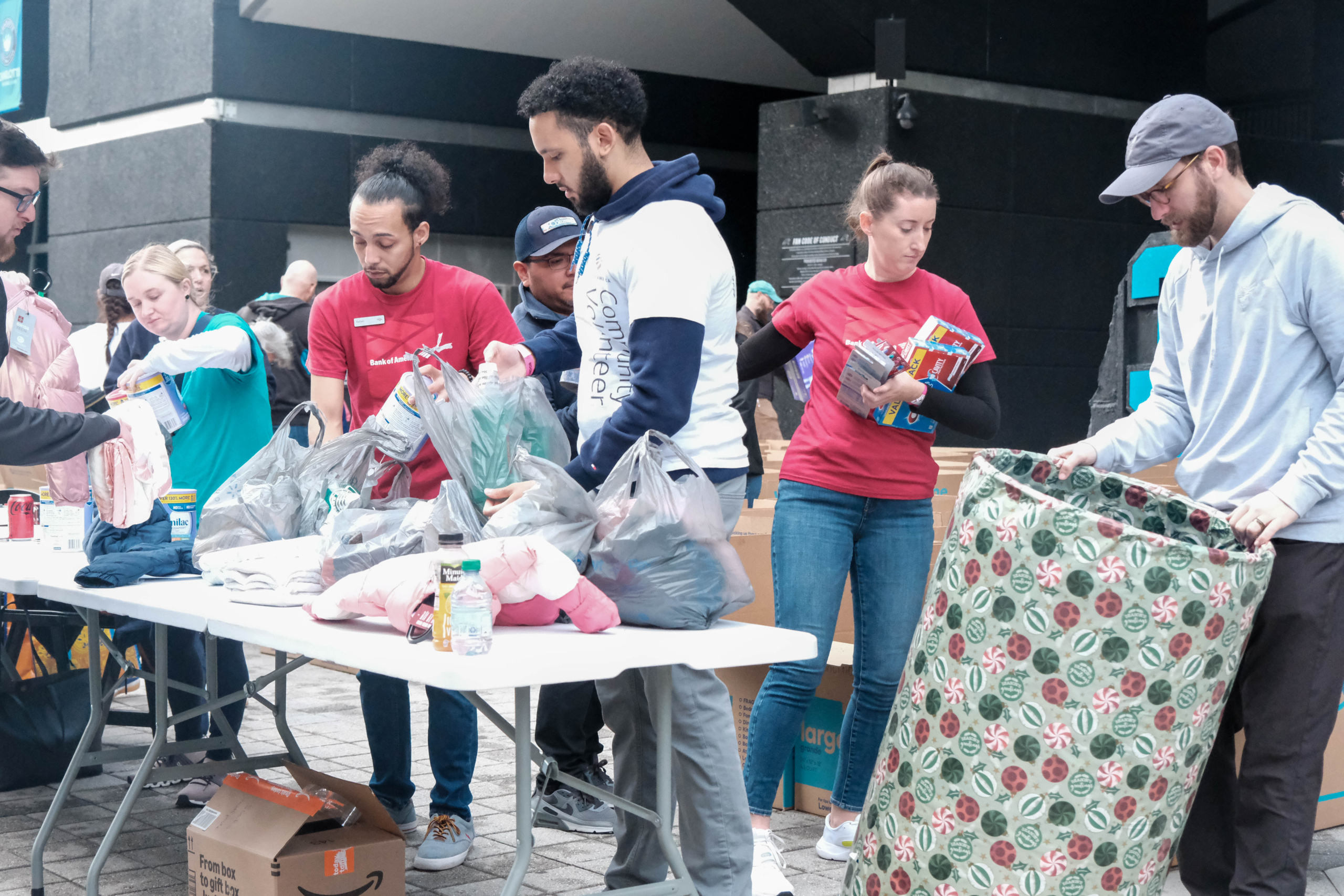Racial disparities across workforce, industries, and wealth remain pronounced in the Charlotte Region. Regional socioeconomic mobility initiatives show slight progress in business ownership, but not enough to reduce racial gaps. Minority groups and their families are still experiencing the economic effects of the pandemic, especially in the current inflationary environment, causing significant pressures on generational wealth. A significant number of minorities are unable to climb the economic ladder due to a number of reasons including, but not limited to, low income and educational attainment, and lack of opportunities for business ownership. While the share of unemployed minorities (50.5%) is not much higher than white counterparts (49.4%), average wages earned by minority groups for at least a year of employment across all industries are significantly lower – almost two times less than their peers.
Recent demographics across regional workforce reflect racial disparities. About 63% of workers are white, 23% are Black/African American, 8% are Hispanic of any race, 4% Asian, and 2% for two or more races. While Black Americans make up 23% of the overall workforce, they account for more than 30% of the workforce across industries historically known of having higher concentration of minorities and lower wages (e.g. health care and educational services, warehouse and transportation, accommodation, and food services, etc.), and less than 15% in professional and technical services.
Total workforce by race and ethnicity, Charlotte Region
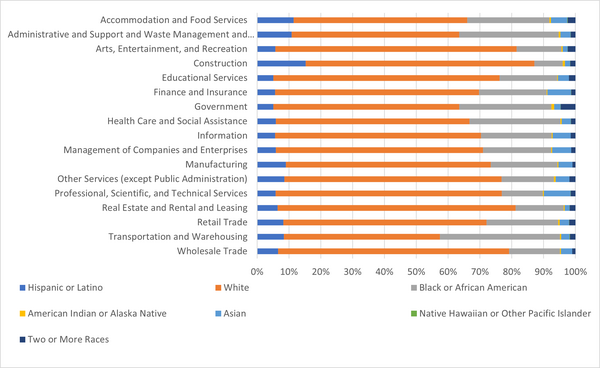
Source: Lightcast, U.S. Census Bureau 5-year estimates, CLT Alliance analysis, 2024
Racial disparities remain similar across occupations with varied differences among racial groups. For instance, while Asians make up only 4% of the workforce, they are more concentrated in health care occupations (e.g. physicians, health scientists, pharmacists, etc.) that require higher educational attainment and wages. Further, minorities continue to be less represented in management positions, with white counterparts dominating the management of companies and enterprises.
Total occupation by race and ethnicity, Charlotte Region
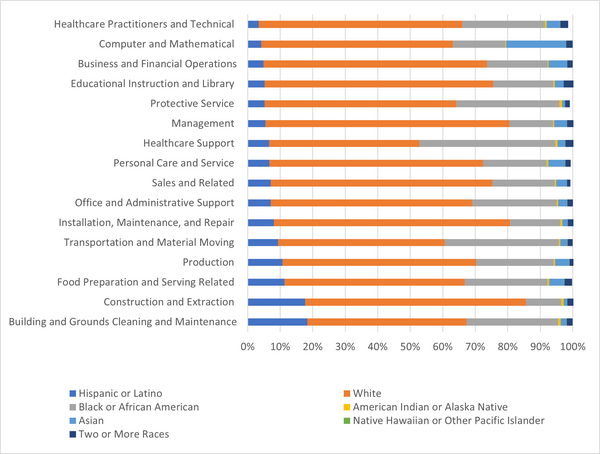
Source: Lightcast, U.S. Census Bureau 5-year estimates, CLT Alliance analysis, 2024
Implementing strategic and actionable diversity, equity, and inclusion (DEI) initiatives are critical to improve parity. DEI trends across the nation remain controversial at workplaces, educational institutions, businesses, and social settings. Lack of flexibility arrangements, low parity in terms of promotion among racial groups, and income inequality are impeding career advancement, financial stability, and overall socioeconomic growth of minority groups.
The latest data available for business ownership by race and ethnicity indicates a slight growth in minority-owned businesses. Lending Tree ranks the Charlotte metro among top 10 metro areas with a high percentage of black-owned businesses, according to the 2022 U.S. Census Bureau Annual Survey. However, this growth is not quite significant to shape diversity and inclusion, and close racial gaps in the regional business community. If Black businesses represented about 24% of employer firms, almost equivalent to the Black population, there would be an additional 13,500 Black-owned businesses. Further, on average, 9 jobs per firm are created by Black businesses compared to 22 for all businesses. And these businesses could create over 31,000 jobs, if the average employee per Black business reached parity.
Business ownership by race and ethnicity, Charlotte Region
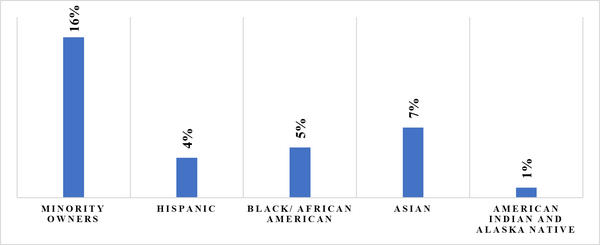
Source: U.S. Census Bureau, Census Builder, 2022
Creating sources of opportunities to increase the number of small business owners will enhance the entrepreneurship ecosystem. About 5% of employer firms are Black-owned businesses, 7% are Asian-owned, and 4% are Hispanic-owned. Creating and bringing awareness to programs, grants, and initiatives targeted at minority small business ownership are essential to reduce barriers for entry in the business ownership sphere in the region. While the region currently provides a plethora of these resources, easy access for minority owners remains limited.
Racial gaps in workforce, occupation, income, and business ownership are barriers to wealth and consequently homeownership. Initiating more income-restricted homeownership policies will improve housing affordability for minorities. In 2022, the median net worth of an average white family was six times greater than that of a Black family. Unequal racial representation associated with differences in income, financial resources, and intergenerational wealth gaps affect housing affordability. Although homeownership rates increased slightly across races over the last decade, gaps widened. According to the National Association of Realtors, homeownership rates in 2022 for white Americans remained higher, at 75% in North Carolina, and 79% in South Carolina, compared to Black Americans at 47% and 56%, respectively.
Data availability to understand the underlying issues of the persistent gaps across racial groups remains a challenge. Creating a centralized data platform to collect racial disparities trends will stimulate more evidence-based policy decisions. One of the main issues hovering over the continued widening gap between minorities and their white counterparts is the lack of available, accessible, and consistent evidence-driven resources about race and ethnic representation across economic growth characteristics. Policymakers and leaders must advocate for more funding for data collection and governance, especially at lower geographical levels (e.g. metro, county, zip code, census tract, neighborhood, etc.).
Prioritizing Inclusive Economic Growth
The CLT Alliance stands at the forefront of efforts to create a community where economic opportunities are not only available, but also inclusive and equitable. The CLT Alliance actively supports initiatives aimed at enhancing access to capital, particularly for small businesses and entrepreneurs from diverse and marginalized backgrounds. Additionally, we advocate for policies that promote the availability of affordable and workforce housing, as well as increased participation in rental assistance programs, ensuring that economic prosperity is within reach for all members of the community.
With a vision to catalyze transformative growth in the Charlotte Region, the CLT Alliance Foundation endeavors to build a brighter future where dynamic small businesses and business leaders thrive. To further its mission, the CLT Alliance Foundation has implemented a range of impactful programs:
- Scale Up CLT: a growth-oriented program for minority entrepreneurs in the region that helps them understand how to scale financially to seven figures and build reputational capital.
- RISE: a new AI-powered digital resource hub that aims at helping entrepreneurs and small business owners across the region with resources for starting, running, and growing a business.
- The Charlotte Small Business Growth Fund (launching Spring 2024): a public-private partnership that matches small businesses to the lender that is best able to serve them.
- African American Leadership Academy of Charlotte: focusing on expanding the number and impact of African American leaders in Mecklenburg County, the Academy is built to help equip, empower, and advance local Black professionals to strengthen the pipeline of executive leaders in the public, private, and philanthropic sectors.
Recognizing the critical importance of addressing racial disparities, the CLT Alliance and the CLT Alliance Foundation are unwavering in their commitment to ensuring socioeconomic mobility initiatives continue. By taking proactive steps, the CLT Alliance and the CLT Alliance Foundation strive to provide economic opportunities to all members of the community, fostering a more inclusive and prosperous future for the Charlotte Region and its residents.

